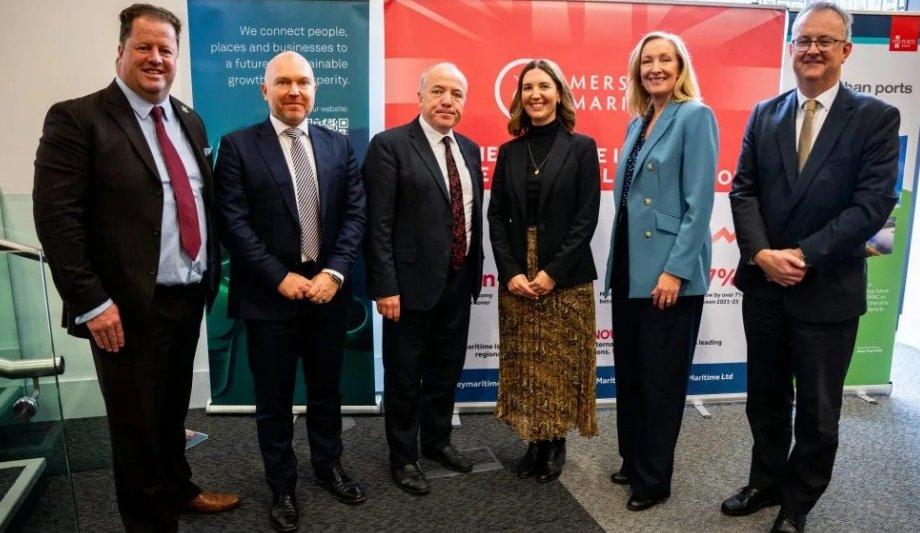The event, organised by the industry’s regional cluster organisation, and hosted by CEO, Ruth Wood, in collaboration with Peel Ports Group and Connected Places Catapult, was hosted in the iconic location of the Liverpool City Region’s Combined Authority at Mann Island.
Maritime Minister, Mike Kane MP, gave the keynote address, his first major speech in his new role at the Department for Transport, and panellist contributions were received from Stephen Carr, Chief Commercial Officer – Peel Ports Group; Mark Wray, Ecosystem Director Maritime and Ports – Connected Places Catapult; Mike Gaynon, Chief Executive Officer – Stanlow Terminals and Katherine Fairclough, Chief Executive – Liverpool City Region Combined Authority.
Key foundation industry
Discussions focused on the economic impact of maritime and the Mersey Estuary in facilitating significant volumes of trade, supporting high quality and skilled jobs, driving productivity and the industry’s role as a key foundation industry for the whole regional economy.
Greener maritime was showcased with the official launch of a major new report
In a wide-ranging question and answer session, the importance of responding to major environmental challenges and delivering cleaner, greener maritime was showcased with the official launch of a major new report exploring the possibilities around a Liverpool/Belfast Green Shipping Corridor, the result of a significant collaborative effort spear-headed by the Connected Places Catapult in partnership with industry and academia locally.
Responsible employment practices
Commenting, Maritime Minister, Mike Kane MP said: “Coastal communities play a fundamentally important role in the UK economy and are critical to its long-term future. That is none more so than here in the Liverpool City Region with its long maritime heritage; the ideal place for me to deliver my first major speech in government at the Department for Transport.”
“Our focus is now on the future. The success of this region has always been built on dynamic innovation and seizing opportunities to grow economically with a focus on skilled, secure, well-paid jobs and embedded in responsible employment practices. The willingness of the industry to meet the challenges of net zero will be key to the years ahead as the new Labour Government delivers on its commitment to energy transition through its flagship GB Energy policy. Maritime businesses in this region are already investing in the green skills and clean jobs that will help us deliver change. I look forward to working with the industry on our shared priorities of growth, skills and decarbonisation in the years ahead.”
Fundamental challenge of decarbonisation
Chief Executive of Mersey Maritime, Ruth Wood, said: “Maritime makes a massive contribution to the Liverpool City Region economy. We know it is worth at least £5 billion in business turnover and supports many thousands of jobs; nearly 50,000. Whilst our long maritime heritage speaks for itself, our region’s industry has never rested on its past, it has always looked to the future.”
“That future is all about the major contribution our significant estuary, the River Mersey, will make to addressing some of the biggest challenges our country faces going forward: delivering economic growth, ensuring a thriving jobs market and responding to the fundamental challenge of decarbonisation and net zero.”
“The North West and Liverpool City Region has the potential to be a driving force in the next green industrial revolution. From offshore wind to harnessing new energy sources in the estuary to world-leading innovation at Stanlow around hydrogen and carbon capture and storage and our business and academic assets, the ingredients exist here. Our future as a sector is incredibly exciting and we look forward to all that lies ahead.”
Major industry sectors
Stephen Carr, Group Commercial Director at Peel Ports Group said: “We were delighted to host industry leaders and welcome the Maritime Minister to Liverpool to showcase the crucial role Merseyside’s maritime sector plays in the regional and national economies.”
“As the UK’s third largest estuary by tonnage, the River Mersey supports a vital and thriving maritime economy for Merseyside, enabling other major industry sectors to grow and prosper across the North West. We stand ready to play our part in supporting the new Government on projects which foster sustainable growth for trade, enhancing skills for quality employment and facilitating the transition to a greener energy future.”
Rich maritime history
Liverpool City Region Combined Authority Cabinet Member for Business, Investment and Trade, Cllr Mike Wharton said: “We have a long and rich maritime history which has been key to the city region’s fortunes. It’s a history of entrepreneurship and innovation – including the world’s first commercial wet dock – that propelled Liverpool City Region’s growth to become one of the world’s most famous and important ports.”
“Our £5bn maritime industry continues to play a crucial role in our economy and we must seize the future, embracing every opportunity to increase trade and economic prosperity to create secure, well-paid jobs, while at the same time leading the way in maritime decarbonisation. I welcome CPC’s Green Shipping Corridor report that outlines a route to a net-zero future for maritime on the River Mersey.”
Steam ship service
Liverpool City Region Combined Authority Chief Executive, Katherine Fairclough said: “The River Mersey has long been the Liverpool City Region’s lifeblood, providing a gateway to the world that’s driven trade, innovation and prosperity.”
“Supporting 48,000 jobs, our £5bn maritime industry remains vital to the city region’s economy and it’s essential we work with our partners to define the next illustrious chapter in our port’s long and storied history. By harnessing our natural assets, we are perfectly positioned to be at the forefront of the green energy transition and through our entrepreneurial and innovative spirit we are well-placed to lead the world in maritime decarbonisation, helping to protect the planet while growing our economy. We welcome CPC’s report on creating a Green Shipping Corridor between Liverpool and Belfast.”
“We’ve come a long way since a steam ship service began operating between the two great ports in 1824. Two hundred years later, advances in technology and our position as a global centre of advanced manufacturing, mean we are well placed to seize the tantalising opportunities offered by embracing and driving the green industrial revolution.”
Green industrial revolution
Mike Gaynon, CEO Stanlow Terminals, said: “We are grateful to Mersey Maritime for the valuable opportunity to hear from the new Minister and from those partners who are ensuring that our region continues to deliver economic growth through our maritime connected ports and infrastructure.”
“We are excited about the investment we are making in industrial decarbonisation and to be part of the development of Green Shipping Corridors. We’ve been serving our region for a century and we remain committed to ensuring that we can continue to provide the vital fuels that our economy needs, today and in the future, whilst ensuring that we are reducing our carbon emission and creating highly skilled well-paid jobs.”












